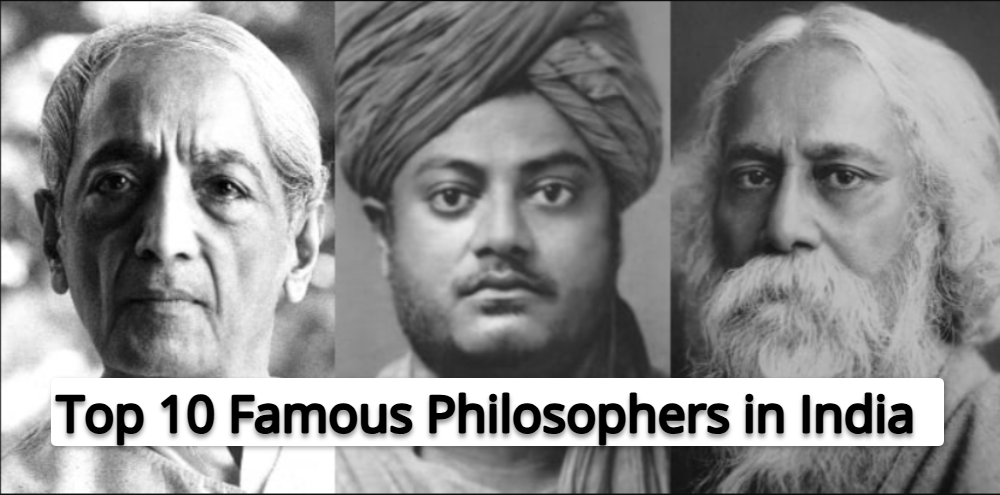Indians are famous for their deep wisdom and their knowledge across the globe. The greatest Indian philosophers have provided ancient wisdom to help in the awakening of millions of people across the globe. They have assisted people comprehend their surroundings and to strive for the creation of a better world. The top 10 philosophers from India are listed below.
1. Ramakrishna Paramahamsa:
He is among the most well-known Indian philosophers, and his biography was translated into over 80 languages. He was a worshiper of goddess Kali. He is also said for his adherence to various rituals of his Hindu tradition. He believed in the unity of all religions and believed that all religions follow distinct routes to reach the same end. His followers believe that they are being avatars since the man was a religious person early in his life. The Swami Vivekananda, his most important student who promoted his theories across India and in the West.
2. Swami Vivekananda:
The name was originally Narendranath Datta He was a well-known Hindu Buddhist monk. He was also a religious teacher philosopher, author, and writer. He played a significant part in introducing Yoga as well as Vedanta into people in the Western world. He is considered to be the founder of Indian nationalists and is credited with the establishment of Hinduism as a major religion around the globe during the 19th century. His birthplace was Calcutta to an ethnically diverse Bengali family, and showed an attraction to spirituality and religion at an early age. The American paper referred to him as an orator with divine appointment and a prominent figure in the parliament. His birthday is celebrated in the form of National Youth Day in India.
3. Adi Shankara:
He is a significant Vedic expert as well as an Acharya in the Advaita Vedanta. He was a recognizable representative of the Hindu faith and culture. He is believed to be the person who brought back the Hindu Dharma from the attacks by other influences from religions. He is also regarded as the one who brought together all the social groups by introducing the pancayatana type of worship. He was the founder of numerous monasteries, and was also the founder of Dashanami’s monastic order.
4. Vyasa:
Vyasa is considered to be more of an aristocrat than a philosopher. He is believed to be the person who identified the Vedas. He is also considered to be the author of the epic Mahabharata. He is also believed as the partial incarnation of the god Lord Vishnu by a lot of Hindus. He is the man who was behind the creation of Eighteen Puranas and the Brahma Sutras. He also played a key role in the division of all the Vedic rituals in four distinct work. Vyasa is considered to be among the living, and is believed to be alive, even in the present Kali Yuga.
5. Chanakya:
Chanakya was born in the year 371 BC in India is an old Indian economist, philosopher and jurist, teacher and advisor to the royal family. Chanakya is believed to have been influential in the creation of the Mauryan Empire and is the first political scientist and economist from India. Arthasastra the ancient treatise on politics that is believed to be of immense importance even in the present was written by Chanakya. The book sheds to management and is utilized by experts in management even today.
6. Rabindranath Tagore:
Rabindranath Tagore, the composer of The composer of the National Anthem was born in Kolkata in 1941. He was a famous Indian multi-faceted scholar who contributed major contributions to the arts, literature and the philosophy. Tagore was also known by the name of “Bard of Bengal,” is credited with influencing Bengali music and literature. He was one of the very first Indian and also the first non-European winner of the Nobel Prize for Literature. He also composed the national anthems of Bangladesh. Gitanjali is a collection of poetry by Rabindranath Tagore is his most renowned and significant work, aside from his other works that promote philosophical ideas.
7. Dayananda Saraswati:
Dayananda Saraswati is a very well-known Hindu philosophy, social activist and the creator of the Arya Samaj. He was the key person in guiding the reform movement within Hinduism. His most famous publication, Satyarth Prakash, was an influential work about the philosophy of the Vedas. Dayananda was a proponent of the doctrines of karma as well as Reincarnation, and he opposed the concept of untouchability. He was referred to as one of the creators of Modern India by S. Radhakrishnan who was the President at the time of India.
8. Gautama Buddha:
Gautama Buddha was an Hindu ruler who abandoned his fortune to pursue the path of spiritual ascetics and enlightenment. The Buddha is a highly respected teacher and established Buddhism within India at the time of 6 7th century BCE. His teachings, often known as Dharma refers to the law of the universe. It is based upon the principles of unquestionable results of one’s thinking which determine the nature of reality and guide the actions of individuals.
9. Jiddu Krishnamurti:
Jiddu Krishnamurti was a great Indian writer, philosopher, speaker and spiritual leader. He argued the idea that Truth is a land without boundaries and advised against any discipline, teacher or guru. He focused on topics like the psychological investigation, conscious choice as well as spiritual and cultural conditioning. He devoted a large portion of his time giving talks to groups and individuals around the world and the majority of his lectures were published in the same way.
10. Ramanuja:
Also referred to as Ramanujacharya he was an outstanding Indian philosopher and social reformer as well as a Guru. He is considered to be one of the greatest people who practiced his Vaishnavism tradition. He was born in the Tamil Brahmin community in Sriperumbudur under the Chola dynasty. He was married, relocated to Kanchipuram and was educated with Yadava Prakasa. He became the priest of Kanchipuram’s Varadharaja Perumal temple in Kanchipuram. Being a common person we can appreciate the vedic texts today thanks to the efforts of the saintly Ramanuja. He was the first preceptor for the Bhakti movement and introduced the idea that Nature and the resources that she has to offer are sacred.
The most renowned and revered ancient Indian philosophers were integral to the development of modern society, since the majority of their philosophical ideas remain relevant even in current times. They were the main advocates for various important principles to their followers that have been adapted into writings and books for younger generations to follow. They also were instrumental in promoting the old Indian ideas in the Western world, and made us proud in the world.




